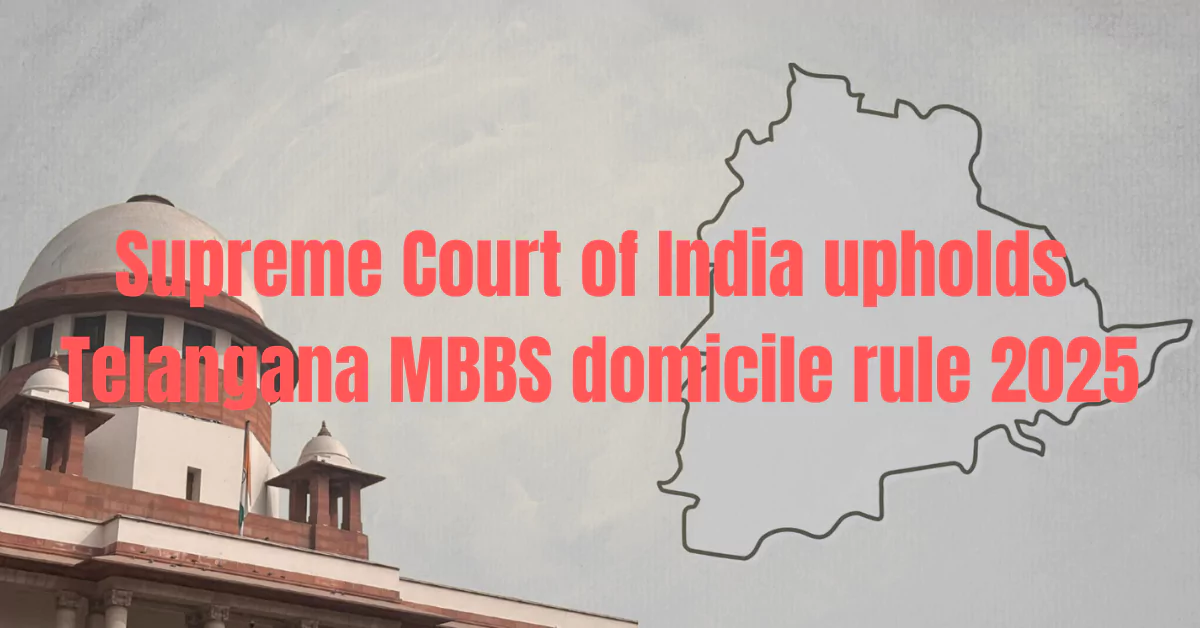Telangana MBBS Admissions 2025: The Supreme Court of India (SC) has delivered a landmark verdict for medical aspirants in Telangana by upholding the state’s 4 study/residence rule for eligibility under the 85% state quota in MBBS and BDS admissions. This decision restores the original intent of the Telangana government’s admission policy, which was amended in 2024 but rooted in the 2017 Admission Rules.
A bench of Chief Justice B.R. Gavai and Justice K. Vinod Chandran reinstated the stricter eligibility criteria while providing reasonable exceptions for children of government servants, defense personnel, and All-India service officers.
Supreme Court Verdict on Telangana MBBS Domicile Rule
The Supreme Court (SC) while hearing The State of Telangana & Others vs Kalluri Naga Narasimha Abhiram & Others, gave judgement in favour of Telangana 4 Year domicile rule.
What is the 4 Year Study/Residence Rule?
To claim a state quota seat in Telangana MBBS admission 2025, candidates must show 4 consecutive years of study or residence in the state. This ensures that local students benefit most from state quota opportunities.
Why Was the Rule Contested?
The rule was challenged by students who had temporarily left Telangana for coaching or education outside the state. They argued that despite being born in Telangana, they were unfairly excluded from local quota seats.
Telangana High Court vs Supreme Court: Key Difference
The Telangana High Court had relaxed the rule to allow broader eligibility, but the Supreme Court reinstated the original rule, emphasising that state quota seats are meant for students who study and live in Telangana. Students who can afford to study outside still have the 15% All-India Quota (AIQ) as an option.
Read Also: NEET UG 2025 Counselling: AIQ vs State Quota
Why Was the Rule Contested?
The Telangana High Court had previously allowed broader eligibility, stating that even students who had temporarily studied outside the state, for coaching or other academic opportunities, should not lose their domicile status.
However, several petitioners and state authorities argued that this diluted the rule’s intent. Many students born in Telangana but pursuing coaching elsewhere felt disadvantaged by the four-year requirement, as they could no longer claim local seats despite being permanent residents.
The Supreme Court, however, emphasised that:
- State quota is meant for local students who studied and lived in Telangana.
- Students who can afford to study outside the state still have a chance through the 15% AIQ seats.
Key Highlights of the Final Supreme Court Judgment
State’s Right to Define Domicile
- The Court reaffirmed that states have the constitutional right to define local candidature for admissions.
- Article 371D of the Constitution supports Telangana’s authority to enforce such rules.
| Article 371D of the Indian Constitution gives special provisions to Andhra Pradesh and Telangana. It empowers the President to ensure fair opportunities and facilities for people across different regions of these states, mainly in public jobs and education. Introduced through the 32nd Amendment in 1973 to safeguard regional interests, it allows the government to organize civil services, define local recruitment zones, and set up an Administrative Tribunal to settle related disputes. |
Rule Restored for 85% State Quota
- Only candidates with four consecutive years of study or residence in Telangana are eligible under the state quota for MBBS and BDS.
Exceptions for Government & Defense Personnel Children
- Children of government servants, defense personnel, and All-India service officers posted outside Telangana remain eligible if they provide valid proof of service.
Alternative Admission via 15% AIQ
- Students not meeting the domicile rule can still secure admission through the 15% AIQ seats, ensuring they are not excluded completely.
High Court Order Overturned
- The Supreme Court reversed the Telangana High Court’s relaxation, restoring the strict four-year domicile rule as part of Telangana’s admission policy.
Read Also: NEET 2025 MCC Choice Filling: AIQ & State Counselling
Impact on Medical Aspirants in Telangana
Eligibility Scenarios Explained
| Situation | Eligible for Telangana State Quota (85%) | Eligible for AIQ (15%) |
|---|---|---|
| 4 years of study/residence in Telangana | Yes | Yes |
| Moved outside due to parent’s govt/defense posting | Yes (with proof) | Yes |
| Permanent resident but studied outside (e.g., coaching) | No | Yes |
What This Means for Permanent Residents Studying Outside
Students who left Telangana for coaching or other academic purposes will not qualify for the state quota, but they can still compete in the AIQ pool.
Options for Students Missing State Quota
Those unable to meet the domicile rule should target AIQ seats or private medical colleges. This highlights the importance of planning strategies early for Telangana MBBS admission 2025.
Why the Telangana Domicile Judgment Matters
Protecting Local Opportunities in Medical Education
- The rule ensures that state quota seats in MBBS admissions go primarily to students who studied and lived in Telangana.
Balancing Fairness with Exceptions
- By granting exceptions to children of transferable government employees, the Court ensured that families serving the nation are not unfairly penalized.
Reducing Confusion and Ensuring Clarity
- This decision eliminates the uncertainty created by different interpretations of domicile rules between the High Court and the state.
Role of Article 371D in State Quota Rights
- The judgment reaffirms Telangana’s constitutional right under Article 371D to define local candidature and enforce domicile policies.
Read Also: Telangana NEET UG Seat Matrix 2025: MBBS, BDS, Category Wise, College Wise Seats
Clarity and Fairness in Medical Admissions
The Supreme Court’s verdict on Telangana MBBS admission 2025, SC upholds 4 year domicile rule has provided long-awaited clarity. While the rule may seem restrictive to some, it ensures that Telangana students truly benefit from the 85% state quota. At the same time, exceptions protect the rights of children of transferable employees, and the 15% AIQ remains a fair alternative for others.
This judgment not only shapes Telangana’s admission landscape but also sets a precedent for other states, reinforcing a balance between local rights and national fairness in India’s competitive medical education system.

